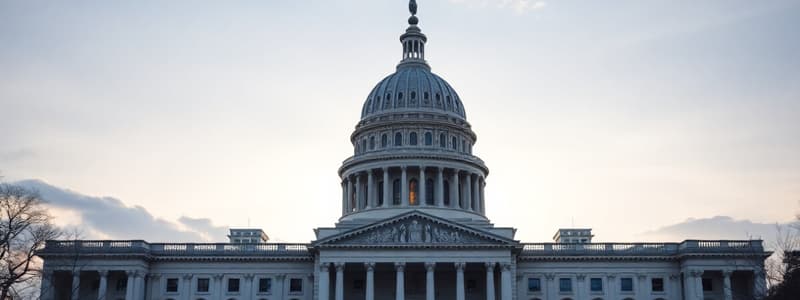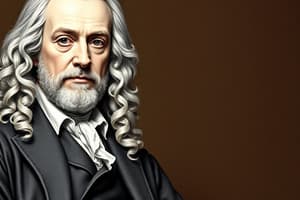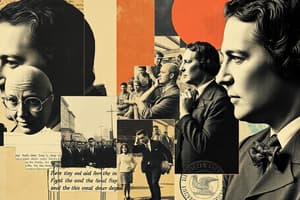Podcast
Questions and Answers
What is the primary focus of Enlightenment thinkers regarding societal improvement?
What is the primary focus of Enlightenment thinkers regarding societal improvement?
- Intolerance must be maintained for social stability.
- Tradition and monarchy should remain unchallenged.
- Human society could improve through reason and reform. (correct)
- Only hereditary rulers can bring about social progress.
Which philosopher is associated with the idea of natural rights and limited government?
Which philosopher is associated with the idea of natural rights and limited government?
- Voltaire
- John Locke (correct)
- Rousseau
- Montesquieu
What principle did Montesquieu promote to prevent tyranny in government?
What principle did Montesquieu promote to prevent tyranny in government?
- Centralized authority and absolute power.
- Democratic socialism.
- Separation of powers. (correct)
- Universal suffrage.
How did Voltaire's views contribute to societal changes during the Enlightenment?
How did Voltaire's views contribute to societal changes during the Enlightenment?
Rousseau's social contract theory emphasizes which of the following concepts?
Rousseau's social contract theory emphasizes which of the following concepts?
What was a primary focus of the Enlightenment movement?
What was a primary focus of the Enlightenment movement?
Which Enlightenment thinker is most associated with the concept of natural rights?
Which Enlightenment thinker is most associated with the concept of natural rights?
Which idea did Montesquieu, an Enlightenment thinker, propose to limit governmental power?
Which idea did Montesquieu, an Enlightenment thinker, propose to limit governmental power?
Voltaire was a champion of which of the following freedoms?
Voltaire was a champion of which of the following freedoms?
What key concept did Rousseau introduce regarding governance?
What key concept did Rousseau introduce regarding governance?
How did Enlightenment thinkers generally view traditional authority?
How did Enlightenment thinkers generally view traditional authority?
Which Enlightenment principle emphasizes the use of logical thinking and critical analysis?
Which Enlightenment principle emphasizes the use of logical thinking and critical analysis?
The Enlightenment's emphasis on individual liberties significantly influenced which of the following?
The Enlightenment's emphasis on individual liberties significantly influenced which of the following?
Flashcards
Enlightenment View of Social Progress
Enlightenment View of Social Progress
The idea that human society can improve through reason and reform.
Liberty
Liberty
The right to freedom of thought, speech, and action.
Popular Sovereignty
Popular Sovereignty
The idea that people should have the power to shape their government and promote progress together.
Separation of Powers
Separation of Powers
Signup and view all the flashcards
Natural Rights
Natural Rights
Signup and view all the flashcards
The Enlightenment
The Enlightenment
Signup and view all the flashcards
Reason in the Enlightenment
Reason in the Enlightenment
Signup and view all the flashcards
Natural Rights (Enlightenment)
Natural Rights (Enlightenment)
Signup and view all the flashcards
Liberty in the Enlightenment
Liberty in the Enlightenment
Signup and view all the flashcards
Social Contract
Social Contract
Signup and view all the flashcards
Individual Autonomy (Enlightenment)
Individual Autonomy (Enlightenment)
Signup and view all the flashcards
Study Notes
Enlightenment: Core Principles & Impact
- Reason as a Cornerstone: Enlightenment thinkers prioritized reason over tradition and faith, emphasizing logical thinking and critical analysis for understanding the world. This shift challenged existing authority.
- Natural Rights: John Locke championed natural rights (life, liberty, and property), inherent to all individuals and unalienable by governments.
- Separation of Powers: Montesquieu advocated for separating governmental powers, limiting potential tyranny and protecting individual rights.
- Freedom of Thought & Expression: Voltaire promoted freedom of speech and religion, critiquing censorship and intolerance.
- Popular Sovereignty: Rousseau's social contract theory emphasized popular sovereignty, empowering individuals to shape their government.
Enlightenment's Understanding of Liberty
- Fundamental Right: Enlightenment thinkers viewed liberty as a fundamental human right, challenging traditional authorities.
- John Locke: Natural rights (life, liberty, and property) cannot be infringed upon by governments.
- Montesquieu: Separation of powers protects individual rights by limiting government power.
- Voltaire: Advocated for freedom of speech and religion, combating censorship and intolerance.
- Rousseau: The social contract emphasized popular sovereignty and individual autonomy.
- Specific Rights: Life (right to exist), Liberty (freedom of thought, speech, and action), and Property (right to own possessions).
Enlightenment View of Social Progress
- Societal Improvement: The Enlightenment believed society could improve through reason and reform.
- Challenging Hierarchies: Enlightenment thinkers questioned traditional hierarchies and promoted societal advancement.
- Locke's Limited Government: Individual liberties were central to social progress.
- Montesquieu's Checks & Balances: Balanced power preventing tyranny.
- Voltaire's Tolerance: Freedom of speech and religion fostered societal openness.
- Rousseau's Popular Sovereignty: Enabled individuals to shape their government leading to societal progress.
- Impact: Enlightenment principles inspired revolutions (e.g., American, French) showing the ability to shift societies by prioritizing reason over traditional practices.
Studying That Suits You
Use AI to generate personalized quizzes and flashcards to suit your learning preferences.




